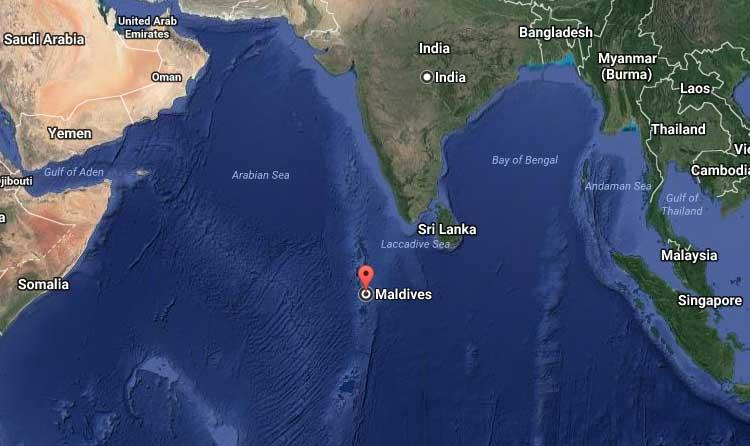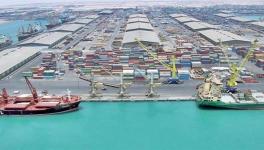Maldives Needs Democracy, Not Indian Intervention

The Maldives made up of 26 coral atolls and 1,192 individual islands, is under the state of emergency. As the island reels under political turmoil, the former President of Maldives, Mohamed Nasheed, has called upon neighbouring India to launch a military intervention. Indian hawks are already on the toes calling for a repeat of Operation Cactus (1988 Indian military operation in the Maldives), and for the restoration of “India’s interest”.
The Indian external affairs ministry in a statement said that the government is carefully monitoring the situation and “in the spirit of democracy and rule of law, it is imperative for all organs of the Government of Maldives to respect and abide by the order of the apex court [Supreme Court of Maldives].”
Terming India’s stand as provocative, former diplomat and political analyst M K Bhadra Kumar said, “The MEA press release on February 2 virtually demanded a certain course of action by the Maldivian government with regard to its domestic politics”.
“The word used was “imperative”, which harks back to the colonial era and gunboat diplomacy”, he added.
According to some reports citing defence sources, the Indian army (including the special forces) and navy are kept on “full operational readiness”. But experts argue that the situation in Maldives is different from 1988 and an Indian military operation will only push the island nation towards chaos.
The Political Drama
On Monday night, hours after the declaration of emergency, soldiers of the Maldivian National Defence Force (MNDF) stormed the Supreme Court in the capital city of Male. The soldiers arrested the Chief Justice Abdulla Saeed and Justice Ali Hameed after a nine-hour siege. This high voltage drama was witnessed in the streets of Male days after the Supreme Court asked the President Abdullah Yameen to release top opposition political leaders including former President Mohamed Nasheed and former Vice President Ahmed Adeeb. The court said in a brief statement that they must be released until fair trials could be conducted without undue influence.
Worried about his political prospects as the court refused to withdraw its order, Yameen suspended Parliament and ordered the Army to resist any moves by the Supreme Court to impeach the President. Naheed’s release would have dampened Yameen’s prospects in the presidential election, which is expected to be held later this year.
Furthermore, the judiciary had also ordered the reinstatement of 12 lawmakers who had been stripped of their parliamentary seats by Yameen's party for defecting to opposition parties. The move would have caused Yameen's party to lose its majority in the 85-member Majlis.
Both the judges were accused of taking bribes and plotting a coup against the government.
Yameen also arrested his half-brother and former President Maumoon Abdul Gayoom. Gayoom ruled the country authoritatively for 30 years before handing over power to the first democratically elected President of Maldives, Naheed. The highlight of Naheed’s presidency was the underwater Cabinet meeting, to highlight the issue of climate change.
The tumultuous past
Exactly six years back, on February 7, Naheed was ‘forced’ to hand over power to his deputy Mohammed Waheed. Naheed had then accused the Gayoom loyalists of plotting a coup against his government. Yameen came to power in 2013 after winning an election, which opposition parties claimed was rigged. Since then the island nation had been witnessing Yameen government “imprisoning opponents, curbing free speech and exerting pressure” on the judiciary. Under Yameen’s presidency, Maldives also saw increasing Islamisation of the society. Last year in April, a blogger and activist, Yameen Rasheed, was stabbed to death allegedly because of his political satires against religious fundamentalism and government establishments.
In 2015, Naheed was convicted on terrorism charges and was sentenced to 13 years in prison, which according to critics and Amnesty International is “politically motivated”. Naheed took political asylum in Britain where he had gone for medical treatment.
Apart from authoritarian leadership, Yameen had been accused of corruption, thuggery and international money laundering. A 2016 documentary by Al Jazeera, Stealing Paradise claims that “he received bags packed with up to $1 million in cash, so much cash that it was "difficult to carry."
Amid Yameen’s consolidation of power, the relationship between him and his half-brother Gayoom fell apart, and Gayoom sided with the opposition. Gayoom still commands significant loyalty in the security forces and it was reported that some of the officers who came for his arrest saluted him.
Foreign Players
The two foreign players that have a profound impact on the Indian Ocean country are, as political analysts argue, Asian rivals- India and China.
India had traditionally considered the Maldives as its “all-weather friend” and it was to save the government of Gayoom in 1988, that New Delhi launched the military operation. The operation (Cactus), involving landing of paratroopers in Male and deploying naval ships, thwarted a coup attempt by a group of Maldivians led by Abdullah Luthufi with the assistance of People's Liberation Organisation of Tamil Eelam (PLOTE).
Nasheed had once said that the ties between India and Maldives are ‘historic’ and “date back to 2,000-3,000 years”.
Recently, the relationship between India and Maldives has deteriorated after the Yameen government began strengthening political and economic ties with China. China and Maldives last year had signed 12 major agreements on Belt and Road construction, free trade, human resources, oceans, environment, healthcare and finance. Also, Chinese companies are being awarded major infrastructure projects in Maldives, with Indian ones lagging behind.
"As India tries to establish itself as the preeminent power in the Indian Ocean region, the Maldives has become increasingly important," said Constantino Xavier, a fellow at Carnegie India in New Delhi. Yameen has "definitely accelerated his outreach to China, to fend off pressure from the west and also reduce leverage from India."
India considers growing influence of China in the Maldives as part of Beijing’s ‘string of pearls’ strategy to encircle India.
China on its part has warned against any military intervention in the Maldives and said that political crisis needs to be solved through dialogue. “We hope various parties of the Maldives will properly resolve differences through dialogue and negotiation, resume the normal order as soon as possible and maintain national and social stability,” the Chinese Foreign Ministry spokesman said in Beijing.
The Presidential Election
As the turbulence in the Maldives continues, the role of security forces is quite crucial. Some of the elements in the security forces are still loyal to ex-President Gayoom and this may lead to a split in the security services.
The presidential election scheduled for later this year will be a farce without any credible opposition as most of the opposition leaders are now jailed. With the conviction against Nasheed reinstated, he would not be able to contest the election.
In this backdrop, India is concerned about China-friendly Yameen coming back to power. Already, the victory of the communist alliance in Nepal had been a shocker for the conservative Modi government in India. The Indian government under the leadership of Prime Minister Narendra Modi had been accused of promoting jingoism and curbing democratic rights in the country.
But any intervention in the Maldives by India in the name of ‘democracy or law and order’ will be a blunder and gross violation of international law. We have seen what has happened to ‘foreign military interventions’ across the globe for democracy- from Afghanistan to Iraq. Only chaos has been brought through such moves and not any democracy.
Political experts argue that there is an urgent need for political and judicial reform in the country to take the Maldives towards achieving democracy. The people’s movement can only alter Yameen’s authoritarian and judicial incompetency, which currently is destroying the nation.
Get the latest reports & analysis with people's perspective on Protests, movements & deep analytical videos, discussions of the current affairs in your Telegram app. Subscribe to NewsClick's Telegram channel & get Real-Time updates on stories, as they get published on our website.
























